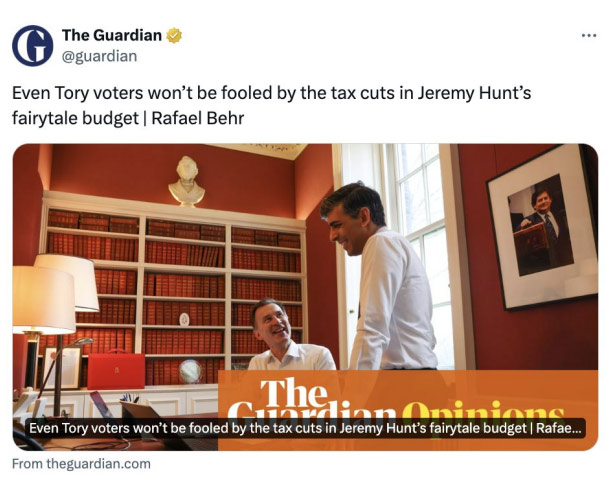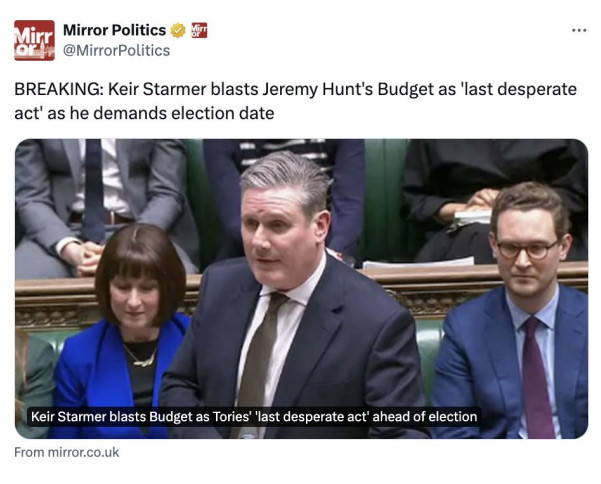Spring Budget 2024: Press and public reaction
Written and compiled by Phoebe-Jane Boyd, Dahye Lee, and Sal Morton.
With a potential UK General Election on the way, and the fortunes of the ruling party dwindling, yesterday’s Spring Budget from the Conservatives faced close scrutiny. Chancellor Jeremy Hunt was under particular pressure to deliver from his own party, his rival MPs, and – of course – the UK press and public.
Using data from our sister social listening platform Pulsar from Wednesday 6th March 12:30pm to 4pm following the Budget reveal, here is an overview of press coverage and online conversation around Hunt’s statement.
Download the Vuelio Political team’s Spring Budget Summary and Stakeholder Reaction report and the full Audience Reaction.
Media reaction
Hunt’s delivery itself contained plenty of surprises for the journalists covering it as well as the people watching from home. Reports this afternoon included the repeated reprimands for rowdiness from Deputy Speaker Dame Eleanor Laing, and Hunt’s jibes towards Starmer & co., sitting opposite.
Of the Spring Budget content, media attention yesterday afternoon went to the widely-expected 2p cut to National Insurance, axing of ‘non-dom’ tax rules, the new levy on vaping, an extra £100 million for the Northern Ireland Executive, the launch of a British ISA, an extension to childcare cost help, and Hunt’s claim that UK growth is higher than every large European economy.
On top for driving the Spring Budget conversation was The Guardian, followed by the Mirror and City A.M.. Surprisingly, broadcasters Sky News and BBC’s live coverage didn’t spark as much reaction from those following along. Also interesting – the Manchester Evening News sparking more conversation than UK-wide outlets the Financial Times, The Times, and the Evening Standard.
Audience reaction on social media
Analysing the top 15 topics spoken about in relation to the Spring Budget reveals a focus on both National Insurance and Recession/Inflation, which account for 12% and 10% of the share of conversation respectively.
The Chancellor’s decision to cut NI, saving the average worker £450, has unsurprisingly sprung ahead in conversation. However, despite these savings, many individuals are skeptical about the intentions behind the changes.
The upcoming General Election is an underlying theme in the biggest topics in the conversation, with many trying to suss out Sunak and Hunt’s game plan going forward.
When we collate all topics and break them down by category, categories related to the economy and finance stand out more prominently – not surprising given the Budget’s focus on reducing personal & corporate taxes.
Work and Pensions account for over a quarter of the conversation (26%), followed by discussions on Recession and Healthcare, which take shares of voice of 14% and 13% respectively.
Hunt’s emphasis on lower taxes prompted more public discussion on how it will affect taxation for working people and potentially exacerbate the UK’s economic downturn. Although the Budget prioritises increased investment in technology and energy, public interest remains largely centred on the impact of personal taxes.
Many negative reactions come in the Healthcare conversation, where £3.4bn has been allocated for a ‘productivity plan’ that includes IT system updates – this is met with scepticism following the so-called ‘dodgy deals’ during COVID-19 involving Track & Trace funding. Positive but muted reactions come in the area of TV, film, and theatre funding – the surprise announcement is yet to make a huge conversational impact, likely as target audiences weren’t primed for this announcement. The UK arts industry has long been asking for increased funding, with 2020’s ‘Rethink. Reskill. Reboot.’ campaign leaving many communities fearing that the Conservative Party had no faith in arts and culture.
We measured which news outlets posted the most about the budget following the announcement, with The Guardian as standing out as the most influential outlet in the Spring Budget conversation. One of the liberal paper’s most-engaged articles by Rafael Behr has ignited public discourse on how this Budget might impact the upcoming General Election.

Left-leaning tabloid The Mirror takes second place, largely due to its coverage of Sir Keir Starmer’s statement, in which the Labour leader criticised Jeremy Hunt’s Budget as a ‘last desperate act,’ while also pressing for a General Election date.

For more on UK politics as the race to the General Election heats up, sign up for the Vuelio General Election Bulletin as well as our weekly Point of Order newsletter.








Leave a Comment